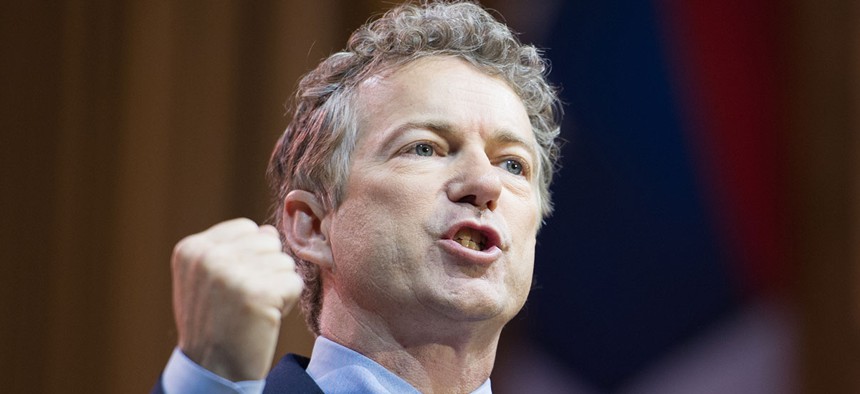
Christopher Halloran / Shutterstock.com
Senate GOP Could Check Trump
On the filibuster, foreign policy, and Cabinet picks, Republicans are already behaving more independently than Democrats did under President Obama.
In working to get his agenda passed through Congress, President-elect Trump faces an inconvenient reality: Republicans will hold just 52 seats in the Senate (assuming they win a December runoff in Louisiana), their narrowest majority in the upper chamber since George W. Bush’s first term. This means individual GOP senators could block or delay President Trump’s appointments and policies.
During the presidential campaign, many GOP senators needed to stay on Trump’s good side to win election. But the political leverage shifts during the next two years. Only eight Republican senators, compared to 25 Democrats, are up for reelection in 2018, a remarkably low level of exposure. Most now have the political space to stand on principle, rather than having to toe the GOP line out of electoral necessity. Trump will need every vote he can muster from a Republican Party that has been notably fractious over the past decade.
The big question, then, is: Will Republicans flaunt their independence in a Trump administration, scuttling unqualified Cabinet picks and rejecting policies they deem ill-advised? Or will they act more like Harry Reid’s Senate Democrats during the Obama administration, largely voting in lockstep to support the president’s agenda, even when his proposals lacked public support?
There are clear signs that Republicans are already feeling their oats. Sen. Rand Paul publicly announced that he wouldn’t support Trump loyalist Rudy Giuliani or hawkish John Bolton as secretary of State, single-handedly scuttling the odds of the two early front-runners for the plum position. Sens. Orrin Hatch and Lindsey Graham have been outspoken in their opposition to killing the filibuster even though it would be in their party’s short-term interest to do so. “I’m one of the biggest advocates of the filibuster. It’s the only way to protect the minority, and we’ve been in the minority a lot more than we’ve been in the majority,” Hatch told The Huffington Post.
A significant contingent of Republicans will monitor the Trump administration’s relationship with Moscow to ensure that the party’s muscular foreign policy toward Russia and other unfriendly countries remains intact. Sen. Ted Cruz will keep a sharp eye on Trump’s Supreme Court pick and raise an unholy ruckus if the president fails to nominate a conservative jurist. Paul, who is sure to be a thorn in the administration’s side, will have enormous leverage when the party needs a unified caucus to get legislation passed. Fiscal hawks will take a hard-eyed look at Trump’s big-ticket proposals.
In light of that, Trump’s selection of Elaine Chao as Transportation secretary was a canny political move. His expensive infrastructure plan could run into a wall of GOP opposition. But by picking Mitch McConnell’s wife to head the department responsible for allocating infrastructure funds, Trump would put the majority leader in an uncomfortable position if he cries foul. As Graham put it: “Christmas at the McConnell household sure will be interesting.”
In any event, it’s naive to expect Republicans to automatically do President Trump’s bidding. The political paths to victory for Trump and Senate Republicans were a lot different. Trump set Republican records for support in white working-class areas across the country, particularly in the Midwest. He ran ahead of GOP Senate candidates in these strongholds.
However, in the affluent suburbs, Trump performed poorly. Sen. Pat Toomey ran 6 points ahead of Trump in the Philadelphia suburbs, while Sen. Ron Johnson ran 8 points ahead in the pivotal Milwaukee suburb of Waukesha County. Trump’s pick to lead the Health and Human Services Department, Rep. Tom Price, represented a suburban Atlanta district that gave Mitt Romney 61 percent of the vote in 2012. Trump barely won with just 48 percent.
These affluent, typically Republican voters won’t be looking for trade wars with China or crackdowns on immigration. They’ll be providing Republican senators with the political support to challenge Trump when he diverges from the traditional conservative consensus. Trump will have his own arsenal at his disposal—a bully with a pulpit, a Twitter following of more than 16 million, and his own base of loyal supporters—but he also is saddled with historically high negatives for a president-elect.
Democrats, meanwhile, need to distinguish between when Trump picks unqualified nominees and pursues unpopular legislation and when he simply does things that any conservative-minded president would do. It’s telling that many liberals loathe Mike Pence, a principled social conservative, as much as they dislike Trump. They’re reserving as much anger for school-choice advocates (such as Betsy DeVos) and Obamacare opponents (such as Price) as they are for appointees with checkered histories. If Democrats keep their powder dry for moments when Trump overreaches, they may find they’ll have some alliances of convenience across the aisle.







